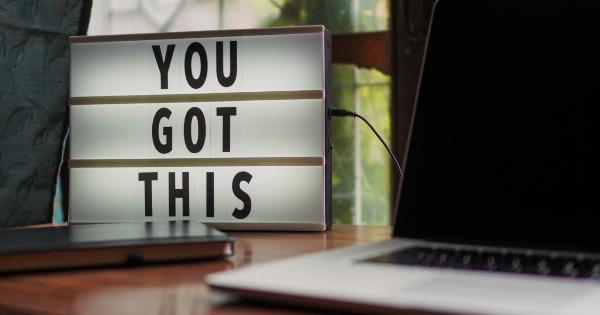Building habits is a crucial element in personal development and achieving long-term success. However, many individuals struggle with the uncomfortable side effects that can accompany habit formation.
Whether it’s the overwhelming feeling of change, the frustration of setbacks, or the fear of failure, these side effects can hinder our progress and discourage us from pursuing our goals.
The Importance of Habits
Habits are powerful forces that shape our lives. They determine our actions, define who we are, and ultimately, determine our level of success.
Positive habits, such as regular exercise, healthy eating, and effective time management, can vastly improve our overall well-being and productivity.
On the other hand, negative habits, such as smoking, procrastination, and excessive screen time, can have detrimental effects on our physical and mental health.
Recognizing the importance of habits in our lives is the first step towards building positive and sustainable routines.
The Challenge of Habit Formation
While the benefits of habits are undeniable, the journey towards establishing new routines can often be challenging and uncomfortable. This is because our brains are wired to resist change and prefer familiarity.
As a result, breaking free from old patterns and creating new habits requires conscious effort and persistence.
Understanding Uncomfortable Side Effects
When we embark on the journey of habit formation, it’s important to be aware of the potential side effects that may arise. These discomforts are natural reactions to change and can include feelings of stress, resistance, and self-doubt.
By understanding and acknowledging these side effects, we can better equip ourselves to navigate through them and ultimately emerge stronger on the other side.
Overcoming the Uncomfortable Side Effects
While uncomfortable side effects are inevitable, there are strategies we can employ to mitigate their impact and make the habit-building process more enjoyable and sustainable.
1. Start with Small Steps
One of the biggest mistakes people make when trying to build new habits is taking on too much at once. This often leads to overwhelm and discouragement.
Instead, focus on starting with small, manageable steps that gradually build up towards your desired habit. For example, if your goal is to read more, start by committing to reading just five pages a day. As you consistently achieve this small goal, you can gradually increase your reading time.
2. Celebrate Progress, Not Perfection
It’s important to remember that building habits is a journey, not an overnight transformation. Instead of aiming for perfection, celebrate each step you take towards your goal. Recognize and appreciate your progress, no matter how small.
This positive reinforcement will help keep you motivated and resilient when faced with setbacks.
3. Focus on the Benefits
When encountering uncomfortable side effects, remind yourself of the long-term benefits and rewards that your new habit will bring.
Visualize the positive impact it will have on your life, whether it’s improved health, increased productivity, or a sense of fulfillment. Keeping your eye on the prize will help you push through the temporary discomfort and stay committed to your habit-building journey.
4. Embrace Accountability
Accountability can be a powerful tool in habit formation. Find an accountability partner or join a supportive community that shares your goals.
By having someone to share your successes, setbacks, and challenges with, you’ll feel more motivated and less alone in your habit-building journey. Whether it’s a workout buddy, an online community, or a mentor, surrounding yourself with like-minded individuals will help keep you accountable and provide valuable support.
5. Make it Enjoyable
Building habits doesn’t have to be a tedious and monotonous task. Infuse joy and creativity into your habit-building process. If your goal is to exercise regularly, find an activity that you genuinely enjoy.
Whether it’s dancing, hiking, or playing a sport, incorporating fun into your routine will not only make it more enjoyable but also increase your chances of sticking with it.
6. Be Kind to Yourself
Remember that building habits is a gradual process filled with ups and downs. Avoid unrealistic expectations and self-criticism. Instead, practice self-compassion and kindness. Treat setbacks as learning opportunities rather than reasons to give up.
The more you cultivate a positive and forgiving mindset, the better equipped you’ll be to overcome uncomfortable side effects and continue building sustainable habits.
7. Seek Support
If you find yourself struggling with the side effects of habit formation, don’t hesitate to seek support from professionals.
Consider working with a therapist, coach, or mentor who can provide guidance, encouragement, and tools for managing discomfort. Seeking external support can make a significant difference in your habit-building journey and help you navigate through challenging moments.
8. Reflect and Refine
Regularly reflect on your habit-building process and make adjustments as needed. Observe what works for you and what doesn’t.
If a particular approach isn’t yielding the desired results or causing excessive discomfort, be open to modifying your strategy. Building habits is a highly individualized process, and what works for one person may not work for another. Stay open, flexible, and willing to refine your approach as you progress.
9. Practice Patience
Rome wasn’t built in a day, and neither are habits. Developing new routines takes time, effort, and patience. Embrace the idea that habits are lifelong journeys rather than quick fixes.
Understand that there will be setbacks, roadblocks, and challenges along the way. However, by maintaining a patient mindset and staying committed to the process, you’ll be more likely to build habits that last.
10. Stay Consistent
Consistency is crucial in habit formation. Make a commitment to show up for your new habit every day, even when it feels uncomfortable or inconvenient. Consistency is what turns actions into automatic routines.
By staying consistent, you’ll gradually reduce the uncomfortable side effects as your new habit becomes ingrained into your lifestyle.
Building habits without experiencing uncomfortable side effects is possible with the right mindset, strategies, and support.
By starting small, celebrating progress, staying focused on the benefits, embracing accountability, incorporating enjoyment, and being kind to yourself, you can navigate through the discomfort and build sustainable habits that lead to long-term success.





























